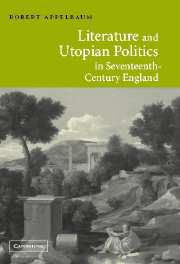Book contents
- Frontmatter
- Contents
- Acknowledgments
- Introduction
- Chapter 1 The look of power
- Chapter 2 Utopian experimentalism, 1620–1638
- Chapter 3 “Reformation” and “Desolation”: the new horizons of the 1640s
- Chapter 4 Out of the “true nothing,” 1649–1653
- Chapter 5 From constitutionalism to aestheticization, 1654–1670
- Notes
- Index
Chapter 5 - From constitutionalism to aestheticization, 1654–1670
Published online by Cambridge University Press: 22 September 2009
- Frontmatter
- Contents
- Acknowledgments
- Introduction
- Chapter 1 The look of power
- Chapter 2 Utopian experimentalism, 1620–1638
- Chapter 3 “Reformation” and “Desolation”: the new horizons of the 1640s
- Chapter 4 Out of the “true nothing,” 1649–1653
- Chapter 5 From constitutionalism to aestheticization, 1654–1670
- Notes
- Index
Summary
IN RETROSPECT, 1654 AND BEYOND
Ideal political speculation was again and again repudiated in England at the same time as it was achieving its greatest triumphs. Robert Burton renounced his utopianism in the same breath as he developed it. Within a page of remarking that we “had need of some general visiter in our age, that should reforme what is amis,” and outlining what would in fact become a model of the bourgeois nation-state, he ended up insisting that his utopian plans for the future were “vaine absurd, and ridiculous wishes not to be hoped: all must be as it is.” The settlers of New England created their New Jerusalem, founding a good deal of the institutional and social framework of what was to become the United States, by denying that a New Jerusalem was what they were aiming to create, and insisting instead that it was the work, the process, the “wise-walking,” that was essential, and not the actual thing the work might produce. Francis Bacon realized his fantasy of a technocratic monarchy only by imaginatively renouncing his career as an imperial politician, who might among other things invent a utopia: “What? Twice paid?” The gentle reproof of the Bensalemites against their European visitors echoed as the bitter self-recrimination of a man with world historical ambitions, a man who in all seriousness could call upon the educated elite of Europe by saying, “We must begin anew from the very foundations,” but who had just been impeached and disgraced for accepting bribes for petty legal proceedings.
- Type
- Chapter
- Information
- Literature and Utopian Politics in Seventeenth-Century England , pp. 172 - 216Publisher: Cambridge University PressPrint publication year: 2002



